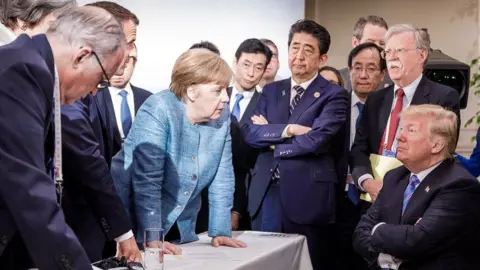G7 summit: Donald Trump lashes out at America's key allies
US President Donald Trump has renewed his attacks on America's closest allies following the divisive G7 summit in Canada at the weekend.
In a string of angry tweets Mr Trump said the US paid "close to the entire cost of Nato" to help protect countries that "rip us off on trade".
The US actually contributes about a fifth of Nato's direct funding under a formula based on national income.
G7 allies criticised Mr Trump's decision to reject a joint communique.
German Chancellor Angela Merkel described his change of heart as "sobering and a little depressing". The French presidency had earlier condemned "fits of anger".
After Mr Trump had left the summit in Quebec he rounded on Justin Trudeau personally, suggesting the Canadian prime minister was "very dishonest and weak" and "acts hurt when called out".
During a news conference Mr Trudeau had reasserted his opposition to US tariffs on steel and aluminium, and vowed to press ahead with retaliatory moves on 1 July.
UK Prime Minister Theresa May told MPs on Monday that she wanted to pay "a particular tribute" to Mr Trudeau for his leadership and skilful chairing.
She said it had been "a difficult summit with, at times, some very candid discussions" and that the UK would honour its commitments in the joint communique.
What has Trump said now?
Mr Trump's latest twitter tirade came after he arrived in Singapore for his summit with North Korea's Kim Jong-un.
"Fair trade is now to be called fool trade," he added in response to the threat of the retaliatory tariffs against the US.
 AFP
AFPThe president tweeted on Monday that America was paying disproportionately more towards the costs of the North Atlantic Treaty Organisation (Nato) than fellow members.
"They pay only a fraction of the cost - and laugh," he wrote, adding that the EU needed to pay "much more" to help fund the international military alliance, which comprises 28 members including the UK, US, Germany, Canada and Turkey. Not all EU members are Nato members.
Mr Trump went on to say that the US gets "unfairly clobbered" on trade despite "protecting Europe at great financial loss".
"Change is coming!" he warned.
Allow X content?
Mr Trump has consistently said that countries that have a trade surplus with the US - meaning they export more to the US than they import - are "taking advantage" of the US.

Context: The US funding of Nato
By Jonathan Marcus, BBC News defence and diplomatic correspondent
While only part of the greater US spending is directed to the collective defence of its Nato allies, President Trump has argued since before his election that the allies are freeloading on the backs of US taxpayers and are failing to spend enough of their own resources on their defence.
This will be an issue at the Nato summit in Brussels in July.
Many Nato countries are now spending more. Will President Trump welcome this trend and encourage them to go further or will he simply castigate the allies collectively for not doing enough?

How did the spat unfold?
Mr Trump said his decision to reject the joint G7 communique was based on Mr Trudeau's "false statements... and the fact that Canada is charging massive tariffs to our US farmers, workers and companies".
Mr Trudeau had said that while he did not want to "punish American workers", his job was to protect Canadians and as such he would press ahead with tariffs on some US imports.
"Canadians are polite and reasonable but we will also not be pushed around," he said.
Late on Sunday Angela Merkel went on German TV to denounce Mr Trump's stance. "We won't let ourselves be ripped off again and again. We will then act too," she said in reference to US import tariffs.
She did, however, accept that Germany had to pay more for its own security even if it was an unpopular step.
Other G7 partners also seemed stunned by Mr Trump's reaction, and pledged to support the communique.
French President Emmanuel Macron said international co-operation could not be "dictated by fits of anger and throwaway remarks".
"Let's be serious and worthy of our people," a statement from the French presidency said. "We make commitments and keep to them."
Guy Verhofstadt, a former Belgian prime minister who as an MEP currently co-ordinates Brexit talks for the European Parliament, mocked Mr Trump's temper and supposed closeness to Russian President Vladimir Putin.
Allow X content?

In recent weeks, trading partners of the US have criticised new tariffs on steel and aluminium imports imposed by the Trump administration.
What are the tariffs?
On 1 June, the US imposed a 25% tariff for steel and 10% for aluminium on imports from the European Union (EU), Canada, and Mexico. Mr Trump said the move would protect domestic producers that were vital to US security.
The EU then announced retaliatory tariffs on US goods ranging from Harley-Davidson motorcycles to bourbon. Canada and Mexico are also taking action.
